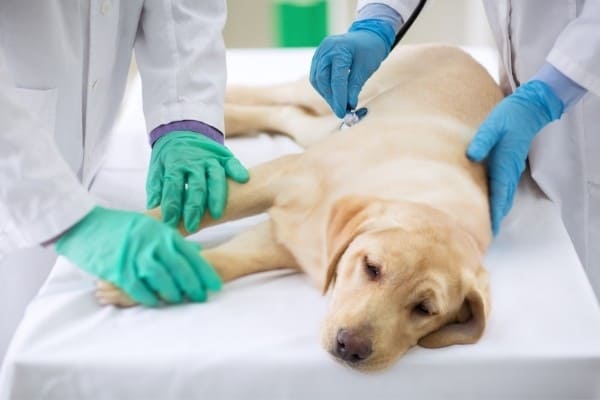Rat poison is extremely dangerous to your dog.
You may be surprised to learn how many different types of rat poison there are and how the effects on your dog can differ.
Will rat poison kill a dog? Rat poison can kill a dog. The severity of the situation will depend on the type and amount of poison consumed and the size, age, and health of the dog. Rat poisons containing aluminum, zinc phosphide, or high levels of vitamin D3 are particularly dangerous.
Rat poison is extremely dangerous for your dog, and it is very common.
Therefore, it is important to educate yourself about the rat poisons that your dog may come upon and the effect they may have before the situation comes up.
How Dangerous Is Rat Poison for Your Dog?
Ingesting mouse and rat poison is one of the most common ways dogs are poisoned in America. These poisons are readily available at any home-improvement store or big-box store.
Many homeowners rely on poisons because rats and mice can be such persistent pests that cause so many problems.
There are all kinds of different types and formulations, making it difficult for a pet parent to identify a risk to their dog immediately.
How dangerous a particular poison is to your dog depends on what kind of rat poison it is.
Let’s look at the primary types of household rodent poison and how they may affect your dog.
Long-Acting Anticoagulants
This is the most common type of mouse and rat poison.
It keeps blood from clotting, which causes internal bleeding in rats and mice. It has the same effect on your pet.
It can be difficult to recognize signs of internal bleeding, especially if your pet has only had a little bit of the poison.
For this reason, dogs can be repeatedly exposed to these poisons over the course of several days before people recognize symptoms.
Usually, a single dose will take three to five days before showing clinical signs.
Dogs who are chronically exposed to the poison are likely to show signs sooner.
Symptoms of poisoning include:
- Lethargy and weakness.
- Coughing and difficulty breathing.
- Exhaustion and heavy breathing with small amounts of exercise.
- Pale gums and signs of dehydration.
- Vomiting, diarrhea, and loss of appetite.
- Nose bleeds, bruising, and bloody urine.
- Bleeding from the gums.
How Dangerous are Long-Acting Coagulants?
Some types of active ingredients that cause blood thinning require only a very small amount to poison even a large dog.
Others require larger amounts of poison to result in clinical signs.
Your dog’s age and other health factors may also affect how much the poison harms your dog.
If your dog is very young or old or has underlying issues with the liver or intestines, he may be less likely to recover.
Some dogs poisoned with this kind of rat poison will die without veterinary intervention, and some may not survive even with a veterinarian’s help.
Vitamin D3 or Cholecalciferol
Previously this type of rat poison was not used frequently, but it is becoming more and more popular.
It causes phosphorus and calcium levels to elevate in the body, which results in kidney failure.
Symptoms typically begin very quickly, and treatment can be very challenging.
Symptoms include:
- Increased urination and thirst.
- Lethargy, weakness, and decreased appetite.
- Irregular breathing.
- Acute kidney failure.
How Dangerous is Vitamin D3 to Your Dog?
Small amounts of vitamin D3 are perfectly healthy for dogs and likely are a part of their healthy diet or multivitamins.
However, the levels of D3 present in rat poison are extremely dangerous and difficult to treat.
Your dog will need to be hospitalized and have laboratory monitoring to survive.
Even with expensive therapy over a long time, your dog may suffer permanent effects.
Aggressive IV fluids and a cocktail of drugs, like steroids and diuretics, to decrease the levels of calcium in the body can sometimes be successful.
Your dog’s blood work will need to be monitored for around a month after ingestion to be sure there is no relapse.
Even a very small amount of this poison may be rapidly fatal for your dog.
Bromethalin
This poison causes swelling of the brain.
The ingredient name is similar to many long-acting anticoagulants, so, unfortunately, it can frequently be mistaken for one of them, although it has very different effects on your dog’s body.
This poison has a complicated effect on the body.
It uncouples oxidative phosphorylation in the mitochondria of the liver and brain. This results in swelling of the brain.
If you have ever seen a mouse or rat behaving very strangely, it may have had this kind of poisoning.
Symptoms generally develop within two hours but may not come up for as many as 36 hours, especially when small amounts have been ingested.
In your dog, this poison will have the following symptoms:
- Lack of coordination or ataxia.
- Tremors and seizures.
- Paralysis and eventual death.
How Dangerous Is Bromethalin for Your Dog?
Your veterinarian will counteract as much of the poison as possible by administering activated charcoal and IV fluids.
Drugs will also be administered to decrease brain swelling, depending on how severe the swelling is.
The degree of danger depends entirely on how much of the poison your dog has ingested and whether the swelling can be controlled in time.
Aluminum and Zinc Phosphide
You usually find these types of poisons for mole baits instead of mouse and rat baits.
However, they are frequently available as across-the-board rodent killer and may also be found in formulas specifically designed for rats and mice.
This is an insidious poison that has some potential dangers for you as well as your dog if your dog ingests it.
Symptoms usually come on quickly and are ongoing for some time. They include:
- Stomach bloating.
- Vomiting and abdominal pain.
- Shock, seizures, and collapse.
- Permanent liver damage and possible death.
How Dangerous Is Aluminum and Zinc Phosphide for Your Dog?
Aluminum and zinc phosphide is dangerous not only to your dog but also to you.
It works by releasing phosphine gas into the stomach. Any food in the stomach increases the amount of gas and the toxicity of the poison.
Your dog will respond to the poison by vomiting. However, the vomit contains phosphine gas and introduces it into the space.
That means that both you and your dog may have severe lung irritation as a result of the gas.
Your veterinarian will treat your dog by applying antacids as soon as possible after ingestion to decrease the gas produced.
Then, vomiting or stomach pumping will be conducted under excellent ventilation and with lung protection to prevent hospital personnel from being exposed to the gas.
You must be extremely careful to protect yourself from the gas, including on a car ride to the veterinarian, during which time you should have all windows open and the fans running.
It takes only a very small amount of this poison to have extremely powerful effects on your dog, so if there is any suspicion that your dog has ingested it, he must be seen by a veterinarian immediately.
How to Take Care of Rats Without Risking Your Dog’s Life
Preventing rats from infesting your property is of course the ideal way to keep your dog away from poisons.
Reduce the presence of things that attract rats, like open sources of food or places that rats can hide, to discourage them without the need of poison or traps.
If you do need to eliminate a rat problem, keep your dog’s (and family’s) safety in mind, and follow these steps.
- Use rat poison with a wider safety margin, like bromadiolone, instead of very concentrated types, like brodifacoum.
- Try other tactics to control rats, like using live traps, sticky traps, or snap traps.
- Have your home treated for rodents by a professional tenting company while you and your dog go elsewhere.
- Never allow your dog to catch mice or rats, and if they do, never allow them to eat them, especially if they’ve been behaving strangely.
Remember that some people also put rat and mouse poison in woods areas or open areas around their property.
Always monitor your dog outside, and never let him range by himself in places he may get into poison.
Why do Dogs Seek Out Rat Poison?
Dogs consume rat poison for the same reason that rats do.
It gives off a distinct, attractive smell and often has a delicious taste as well. It may be sweet or have some other attractive element to it.
Most dogs are naturally drawn to consume rat poison if they can find it.
Dogs may also eat rats that have recently eaten poison and be poisoned as a consequence.





